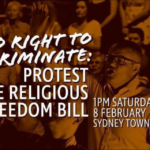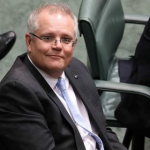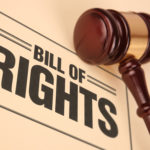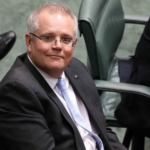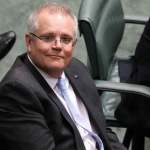Kill the Religious Privilege Bill: An Interview With Satanic Australia’s James Sutekh
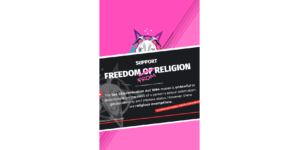
The implications of the prime minister’s Religious Discrimination Bill, and its accompanying legislation, are so dire that people are turning to the Devil.
At three recent Community Action for Rainbow Rights (CARR) rallies held against what’s been dubbed the Bigot’s Bill in Sydney, there’s been a contingent from Satanic Australia handing out pamphlets warning against the legislation that promotes discrimination.
While it recently came to light that the Noosa Temple of Satan outlined in its submission on the second draft of the bill that should parliament pass it Satanists nationwide will be “aggressively” using the legislation’s “privileges” to push for the teachings of Satanism in schools.
However, at last week’s CARR protest – which saw Sydneysiders brave torrential rains – a lone sign stuck out above the crowd stating, “Hail Satan”. And on further inspection, it was found that there was not Satanist holding the sign, but rather, a regular member of the community.
Indeed, it seems that Morrison’s religious privilege crusade is escalating the number of Lucifer followers amongst the general Australian population.
A return to the dark ages
Amongst the plethora of damaging provisions contained within the Bigot’s Bill, there are two that stick out as being the most hazardous. The first is contained in section 42 of the draft bill, which provides that “statements of belief do not constitute discrimination”.
This provision would allow a person to make statements that would otherwise constitute a breach of federal or state anti-discrimination laws if the individual can prove their statement is a belief that’s part of their creed.
The second disturbing law that the Morrison government is fixing to enact is the “health practitioner conduct rule”, which would allow doctors, nurses, midwifes, pharmacists and psychologists to refuse commonplace health services if they conscientiously object to them due to their faith.
In tearing down the anti-discrimination framework that’s been built up in this country since the 1970s, the government will provide that people can be discriminated against on the basis of sex, gender, marital status, race, age and ability if the higher forces say it’s the right thing to do.
Subverting the dominant paradigm
As Satanic Australia sets out on its website, it’s non-theistic, meaning its adherents don’t actually worship Satan, or even believe that he’s a literal being. Rather, Satanists are a group of free thinkers, who promote rational thought.
The movement’s six core beliefs involve rebellion against arbitrary authority and personal sovereignty, self-enlightenment, bodily autonomy, compassion, critical thought, and members “reject supernaturalism and embrace reason”.
Sydney Criminal Lawyers spoke to Satanic Australia spokesperson James Sutekh about the contentions raised in the group’s submission, why it chooses Satan as its central figure, and his school day scripture classes, which were presided over by the founder of the Hillsong Church.
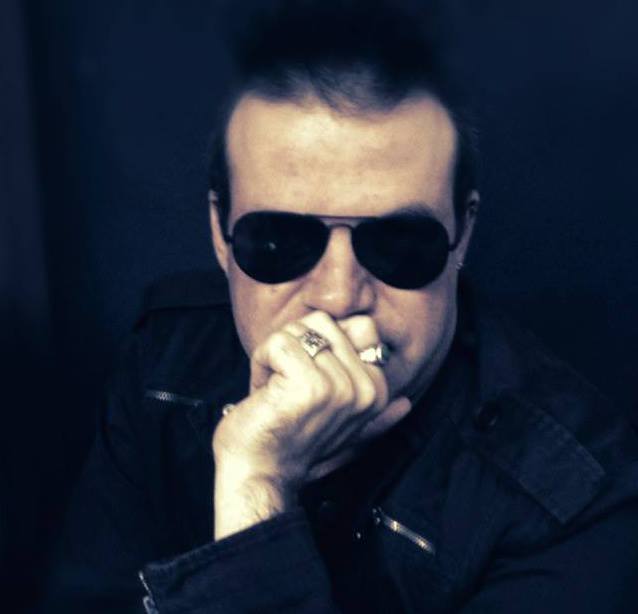
Firstly, Morrison’s Religious Discrimination Bill is set to be tabled in parliament next month, amidst widespread criticism. Satanic Australia has taken aim at the legislation. Broadly speaking, James, what are your groups misgivings about the bill?
This bill starts out semi-reasonable, in the sense that it aims to provide protection to people of faith, which is good in itself, even though the Ruddock review a few years ago said that it was not necessary, and we didn’t need anymore.
However, it goes about this in a very peculiar way, in that in protecting these people of faith from discrimination, it extends that to actually allowing people of faith to discriminate. And that opens up all sorts of problems.
Satanic Australia has presented a submission to the federal government regarding the Religious Discrimination Bill. What are some of the specific provisions within it that concern the group?
It’s an interesting bill to read, because a bill that protects discrimination by allowing discrimination is a bit of mental gymnastics. So, if you don’t have a legal background, it really is quite a strange document.
Essentially, there are four elements that we’re mainly concerned about. And they’re the areas of employment, education, healthcare and freedom of speech.
In regard to employment, we find it really appalling that you would have all these organisations – religious hospitals, aged care facilities and accommodation providers – being allowed to decide whether or not they will employ someone who is a cleaner on the basis of their religion, even though their faith would have nothing to do with their ability to carry out the job.
Similarly, we find it very concerning that religious schools will still be able to operate on a similar basis and make decisions about the employment of teachers, but when it comes to educational facilities, they’re able to do so based on a teacher’s sex, gender or marital status.
We’re more concerned that religious schools are still able to expel students on the basis of their sexuality. And that really is beyond the pale, especially when they’re receiving taxpayer funding.
With regard to healthcare, the second draft of the bill has included that doctors and medical staff can no longer refuse a patient based on who they are, as was provided in the first draft.
But, they can now refuse to provide treatment that they find in opposition to their faith. These services include abortion, gender reassignment surgery, assisted dying, hormone therapy, as well as contraception.
These are things that are uncontroversial these days, although some religious faiths are still opposed to them. And it’s ridiculous that we would have medicine in this day and age allowing faith-based decisions to override evidence-based best practice.
Furthermore, it’s my understanding that private practitioners would be able to make those decisions and organisations like the AMA could not override them. And that seems to be a very odd state of affairs.
Finally, that brings us to freedom of speech. Now, despite what many people believe, Australia does not have freedom of speech laws. And this particular bill seeks to provide them, but only to a specific group of people – that being people of faith and religious bodies.
And as we saw in the case of Israel Folau, this would allow people to say quite outrageous things in the public sphere.
The original spirit of freedom of speech – where it is allowed – is not the same as freedom from consequence.
But, this act is allowing people to say pretty much anything on the basis of it being a sincerely held religious belief and be free of consequences.
In their submissions to the second exposure draft of the bill, certain Christian groups, such as the Australian Catholic Bishops Conference and Christian Schools Australia, have again maintained the bill doesn’t go far enough.
They’ve stated that it doesn’t provide adequate protections for employees of small businesses and government. And there’s also been calls for even stronger protections around the right for healthcare workers and institutions to conscientiously object to medical procedures.
What do you think about these religious bodies calling out for more, after what’s already provided to them in law, as well as in the second draft, which to a large extent was provoked by them?
You do have to wonder what their motivations are when you’ve already got Ruddock’s review saying that more protections aren’t needed.
And really this does seem to be seeking licence to say whatever they like without consequences, which really rolls back progressive social reform and law reform for decades.
It’s hard to understand what other motivations they could have. There’s some degree of reaction to same-sex marriage, which left conservative members of the government and religion unhappy. And this could be payback.
They certainly want to see something in their favour, as same-sex marriage did not go their way.
It’s well-known that the Coalition’s religious right is behind the religious freedoms campaign. As you’ve just mentioned, it was sparked by equal marriage. And it’s perhaps unlikely that it would be given the same emphasis if Scott Morrison was not PM.
However, it still seems very surprising that as the country is facing a number of more pressing challenges one of the key national debates is over freedom of religion. How do you account for what’s going on here?
I agree with you. It’s very strange. You have to wonder if Scott Morrison’s priorities are the same as those of average Australians.
Certainly, we know that Scott Morrison’s religion is very important to him. And we also know that some quite powerful people in places like the Hillsong Church have the ear of the prime minister.
The other thing that we find very disturbing is that as a number of senior figures in the Liberal Party have warned over the last couple of years, these Pentecostal organisations are actively branch stacking Liberal branches, with a view to infiltrating the Liberal Party, and pushing their agenda through by stealth. And they have in many ways succeeded with this.
These Pentecostals only make up about 2 percent of the population, but the numbers in the Morrison government are something like 12 percent.
They’re massively overrepresented. And they have clearly been able to infiltrate the Liberal Party to the extent that even people like Pastor Danny, who used to be Rise Up Australia, have closed their parties down, which is because with Morrison in charge, there’s no point in continuing on anymore.
And who’s that pastor you just mentioned?
Pastor Danny Nalliah. He used to be with Rise Up Australia. He has a very interesting record of calling for the shutdown of bottle shops, synagogues, mosques, Buddhist temples, and pretty much anything that isn’t his brand of Christianity.
As you’ve just mentioned, the prime minister is deeply religious. He’s a parishioner of Sydney’s Sutherland Shire’s Horizon Church, which has strong links to the Hillsong Church.
Satanic Australia recently posted a letter on its Facebook page, which has been written for school principals regarding a proposed Hillsong Church tour. What’s that all about? And what are your misgivings with Hillsong?
That letter is from a group called Keep Hillsong Out of Our Schools. We posted it because we’re deeply concerned about the idea of having organisations like Hillsong penetrating our schools.
Really, our concern is that special religious education shouldn’t be in public schools whatsoever. They should be secular.
But, we have this long history in Australia of allowing religious organisations to take up time in the curriculum. And what they’re teaching is not approved by the education board.
I actually had Brian Houston, the founder of Hillsong Church, as my scripture teacher back in the 80s. So, I know exactly the sort of thing that Hillsong plans to go into schools and say.
Brian, if you want to know how you get Satanists, then that’s how you get Satanists.
Brian didn’t have a particularly good effect on me, but he had a very lasting one.
Contrary to what many might believe, groups like yours don’t actually worship Satan. Rather, they’re non-theistic, meaning you don’t believe in deities. So, why take Satan as a symbol and not some other deity?
I prefer to think of Satanism as a philosophy rather than a religion. Primarily, the first major lesson you take from Satanism is non-subservience, no gods, no masters. You need to think for yourself.
And from this, we take Satan as a metaphor, not a literal being. He’s a metaphor for rebellion against arbitrary authority. Lucifer is a metaphor for the triumph of knowledge over ignorance.
We take this as our metaphor, because the best metaphors are those already in existence. It makes sense for a philosophy based on rebellion against arbitrary authority to focus on the dominant paradigm of where it’s come from, and in our case that’s Christianity.
And lastly, there’s been a wide range of different civil society groups speaking out against the bill, while Labor hasn’t taken a stance on it either way.
With such widespread opposition throughout the community, do you think it’s likely the bill will pass?
That’s an interesting question, as to just what Labor is doing. They haven’t committed themselves one way or another.
But, unlike the government, we do have them consulting with non-religious groups about the impacts of this bill. And hopefully, that’s been taken on board.
We hope that Labor is not being spooked by the idea that some commentators have identified as coming from the last election, which was that it’s important for them to keep Christians onside.
I don’t think this bill is as influential as has been suggested. So, I hope they haven’t taken that away from the last election, or that they’re not being spooked by the traditional level of Catholicism underlying Labor.
Certainly, Labor’s support is going to be the critical factor. So, assuming that Labor doesn’t support it, then our chances of this bill failing are quite excellent.
Already, Jackie Lambie doesn’t support it. One Nation is against it, because they don’t want things like Sharia Law being introduced into Australia.
So, there’s going to be the odd situation where One Nation does the right thing for the worst possible motives.
So, if Labor doesn’t support it, then we can assume that the bill in its current form isn’t going to pass.


